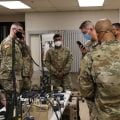When it comes to emergency response, Louisiana takes the safety of its citizens seriously. The state requires all public elementary and secondary schools to prepare, maintain, and implement a crisis management and response plan to ensure that students, teachers, and school employees are safe in the event of an emergency or disaster incident. The Louisiana Department of Children and Family Services (DCFS) works to keep children safe, helping individuals and families to be self-sufficient and providing safe shelter during disasters. The state has established a number of strategic objectives for emergency preparedness.
Under Act 83 of the 1979 legislative session, the Louisiana State Police (LSP) was given legal authority to act as an on-site coordinator for all incidents involving hazardous materials in the state. The LSP is also responsible for providing an emergency response to chemical emergencies at industrial or transport-related sites. In the event of an impending emergency, the Louisiana Department of Education (LDOE) will contact the designated emergency preparedness and recovery representative to remind them to complete and maintain the emergency preparedness and recovery panel. It's important to be aware that a mass evacuation could test the capacity of local resources, so it's important to be as self-sufficient as possible in planning and preparing for emergency response.
Act 435 of the 1985 legislative session established the Right-to-Know (RTK) laws, which require owners and operators to submit inventory forms for all hazardous materials manufactured, used, or stored at their facilities and report any release of certain hazardous materials in certain declarable quantities to the Hazardous Materials Unit of the LSP. The state also has a parish plan for emergency operations for all hazards that includes response measures, hazard identification, assistance catalogs, chains of command and intergovernmental coordination. The REMS Technical Assistance Center website provides free resources, training, and technical assistance (TA) for schools and their community partners on emergency planning and responding to infectious disease outbreaks. Under the authority of the governor, the Governor's Office of Homeland Security & Emergency Preparedness (GOHSEP) is responsible for national security and emergency preparedness.
GOHSEP also develops and maintains a current Emergency Operations Plan (EOP) for the state, which provides for response measures, assistance to local officials, coordination of response activities, and coordination with federal entities. The Emergency Services Unit (ESU) of the LSP is the primary agency with regulatory and legal authority for hazardous materials and explosives in Louisiana. The Emergency Management Institute offers self-paced courses designed for people who have emergency management responsibilities and for the general public. Schools are responsible for the safety and care of students during emergency situations such as natural disasters or other potential hazards. The 6-step Access Readiness and Emergency Management for Schools (REMS) process helps create plans to continuously build and promote safe and healthy school communities before, during, and after potential emergencies.






